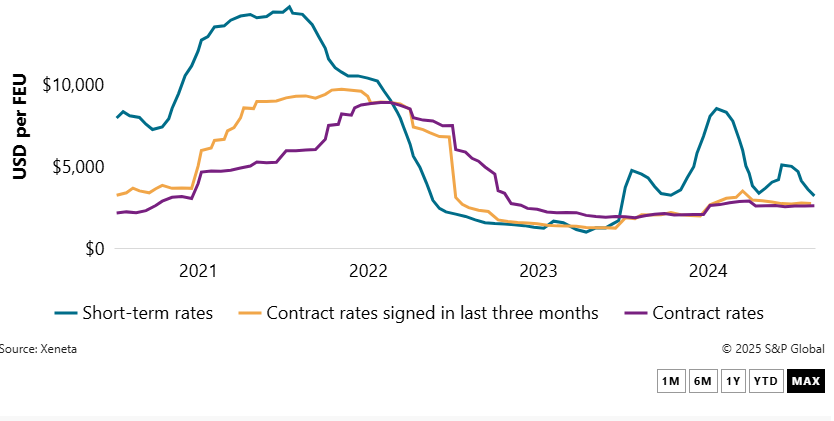
Time:2025-02-19 Popularity:462
Uncertainty over the timing of shipping’s resumption of Red Sea transits is being reflected in Asia-North Europe long-term rate deals, with carriers offering substantial “discounts” to shippers agreeing to contracts longer than six months, according to rate benchmarking platform Xeneta.
The move by carriers comes as the spot market on the eastbound trade lane continues its slide, with Xeneta’s average short-term rates assessed on Tuesday of $2,949 per FEU now just $199 above the long-term rates signed in the last three months. The data shows Asia-North Europe spot rates have almost halved since the start of the year.
Emily Stausbøll, senior shipping analyst at Xeneta, noted in a market update this week that the uncertainty prevalent in the Asia-North Europe trade lane was seeing carriers agreeing to discounts of 22% as they tried to lock shippers in for longer periods.
“On the one hand you have the seller trying to incentivize longer-term agreements to manage risk and protect market share ... on the other hand, you have the buyer doing everything possible to keep their options open for as long as possible while not spending more than necessary,” Stausbøll said.
Marc Meier, global head of ocean freight at the forwarder Toll Group, said freight-all-kinds (FAK) rates on Asia-North Europe were coming under growing pressure and were at the same level as long-term rates for the January to December period.
“We expect the market to be decreasing between now and [the] end of March or early April at the earliest before we see conditions to push for a rate increase,” Meier said.
---------------------------------------------------------------------------------------------------------------------------------------------------------------------------------------------------------------------------------------------------------
Average Asia to North Europe container freight rates, under short-term contracts of 32 days or less, long-term contracts of 88 days or more, and long-term contracts signed in the last three months

Some carriers have announced March 1 FAK rates on Asia-North Europe of $4,100/FEU.
A 22% discount on the current Xeneta spot rate would drop the rate on the index to $2,300/FEU, but with the short-term market softening every week, some cargo owners are holding off on signing contracts.
“Some shippers may be happy to lock in for more than six months if it protects their supply chains and negates the need for further negotiation in the event of another major global disruption,” Stausbøll said. “Other shippers may choose to gamble on being able to achieve a lower rate in a few months and are happy to go through another tender round.”
The risk tolerance level of shippers on Asia-North Europe is ultimately based around a guess when diversions around southern Africa will end. The base case of many analysts is for a return to Red Sea transits at some point in the second half, but the fast-changing political dynamics in the Israel-Hamas conflict provide little certainty.
Carriers have said they will only return to the Red Sea and Suez Canal “when it was safe to do so,” and are continuing to divert vessels around Africa despite Hamas-supporting Houthi militants pledging to only attack Israel-affiliated ships following the start of a ceasefire in Gaza in January.
The only consensus appears to be that when Red Sea voyages do finally resume, significant amounts of capacity no longer being diverted will overwhelm the market.
Sea-Intelligence Maritime Analysis expects the impact to be “dramatic” — although temporary — as the trade lane adjusts to the resumption of shorter transits.
The analyst estimated that demand growth on Asia-Europe received a boost of 2.9 percentage points in 2024 once the longer voyages and increased inventory levels were factored into the equation. Demand would contract by the same amount when the Red Sea reopens, according to Sea-Intelligence CEO Alan Murphy.
“The excess inventory held in the longer supply chain will be released, and for a temporary period, importers will curb ordering to mitigate this sudden excess inventory,” Murphy wrote in his Sunday Spotlight newsletter. “If it unravels over just a few months, the Asia-Europe trade will see dramatic decreases in demand.”
Murphy noted that the fall in demand would occur at the same time as shorter sailing times released significant amounts of capacity into the market, with the supply overhang placing downward pressure on rates.
But carriers have been playing down the impact of overcapacity once the resumption of transits through Suez occurs, pointing to an increase in scrapping — which has been close to zero for the last few years — and the ability to slow steam ships that have been at full speed since the Africa diversions began.
Greg Knowler, Senior Editor Europe | Feb 18, 2025, 1:51 PM EST